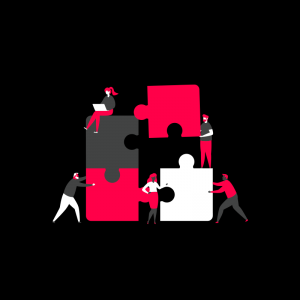
Setting up an ERP project: the keys to success
This article is the continuation of 4 errors in the implementation of ERP / data repository program Each problem in the implementation
There are many pitfalls to avoid when implementing ERP programs and data repository software. Here are 4 of the most important!

The digitization of operations and systems has profoundly transformed business management. These changes have accelerated with the recent COVID crisis, which was a trigger for the implementation of new digital services (read : The 10 priorities of post-Covid CIOs), not only to meet customer needs, but also to adapt company operations to increasingly frequent impacts and crises (becoming more agile and simplifying existing systems).
Embarking on this transformation requires a good command of all the company's assets (stakeholders and their commitment, processes, data, etc.). Silos between business and IT departments, as well as Datalabs that sometimes operate outside a common framework, prevent the capitalization and sharing of knowledge on data and processes.
ERP & data repository projects are particularly affected by these factors, which can lead to projects being abandoned after months of work, or to numerous iterations before a usable result is achieved. Before embarking on this type of program, every company knows that the road ahead will be long and difficult. But let's take a closer look at some of the issues you're likely to encounter in these transformation programs.
Many programs often discover far too late thatthey need to embed many more functional scopes than originally planned. Many adherences between processes and systems are discovered late, sometimes during the acceptance phase, and require a complete overhaul of the schedule and budget, as well as a broader mobilization of the program's various players.
These errors are very common in projects of this kind, and often have multiple origins, but are very often linked to a lack of data maturity (little knowledge of data, processes, etc.) or too rapid a scoping.
Because of its history, its heterogeneity and the fact that it is managed in part by external service providers, the IS is a factor of complexity in ERP/repository projects. Knowledge is often insufficient to correctly identify the impact of major transformations.
To get around this complexity and risk, some projects simply decide not to take it into account, leaving the legacy unchanged.
The new ERP is conceived as an overlay on the existing system, providing new functionalities but adding to the complexity of IS processing. Decommissioning and simplification programs are postponed at best.
The result is an IS that becomes more complex, more costly, more difficult to reorganize and slows down any further evolution.
Technical aspects are all too often given priority, but implementing ERP software means changing processes, and consequently the roles and responsibilities of certain professions, in order to industrialize and improve processes.
This can have an impact on the company's HR organization.
Unfortunately, these impacts on the organization are identified at a later stage, sometimes only when the ERP solution is up and running. The end result is a new solution that is poorly used, and too little deployed in the business.
This kind of negative feedback on a new solution often spells the end of ERP and data repository projects in the short to medium term.
The start-up scope of ERP/Repository projects and user on-boarding are key elements in determining the success or failure of your project. This type of project needs promoters who can speak for the benefits brought by the solution. Including too few users in rollouts, who are sometimes trained too late, will engender distrust in the solution and reduce the investment and effort that future users will put into getting to grips with it.
Unfortunately, this list is not exhaustive, and not all problems are of equal importance to all companies. So there's no simple guide to ensure the success of your project.
But ERP and repository projects are strategic and necessary for a company's Data Driven evolution. Fortunately, it is possible to succeed with ERP and repository projects. second article the different elements to consider before taking the plunge.
And if your project is already underway and encountering difficulties, nothing is lost, but the practices detailed in this second article should be implemented quickly.
Read the rest of this article: How to successfully implement ERP projects and data repositories?

This article is the continuation of 4 errors in the implementation of ERP / data repository program Each problem in the implementation

At iQo, we draw on our experience in supporting organizations, employees and managers to turn data into an effective tool.

Data governance is a major lever for improving performance and accelerating business transformation. Indeed, today, data is an essential
